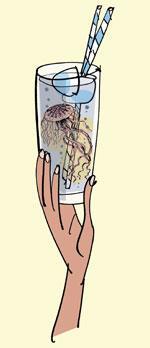Alcohol makes us lose balance, but heavy water has the opposite effect. Could a 'heavy' gin and tonic get us drunk but keep us upright?
Alcohol makes us drunk. It is a slow-acting anaesthetic, sabotaging the brain, releasing our lower nature, and tempting us to easy emotionalism. It upsets our balance, too - one theory is that alcohol reduces the density of bodily fluids. The semicircular canals of the ear, which govern our balance, therefore lose their balancing skill. Deuterium oxide (heavy water, D2O) also upsets our balance. It acts in just the opposite way to alcohol, increasing the density of our fluids. Hence it should be possible to devise a ’heavy gin’ with just the right amount of deuterium oxide in it to keep the endolymph fluid in the semicircular canals at the proper density. A drinker would get as emotional as ever, but his balance would not be upset. Some lucky chemical team could make a whole research program of this - they would have to unscramble the effects of deuterium oxide as a diluent and deuterated ethanol as an intoxicant. I like the idea of a drink which could release the lower emotions to any extent, but still allow you to hold a glass exactly, and to walk a chalk line without tottering or deviating.

Yet there are limits. Heavy water is poisonous in large amounts. How far could you get with isotopically substituted life? Higher elements pose little problem. Their heavy isotopes are chemically so similar to their light ones that any differences do not matter. Mice can have up to 60 per cent of their 12C replaced by 13C; they seem to flourish. ’Deuterated life’, with H replaced by D, is more of a challenge. Deuterium is more different to hydrogen than any other heavy isotope to its light counterpart. But imagine some planet on which only heavy water exists. ’Heavy life’ might still develop on it; and evolution would then increase the range of living species. After all, terrestrial life has adapted to the growing saltiness of the sea - a much bigger fluid change.
Sadly, you cannot make ’deuterated life’ just by taking normal life and adding heavy water - the stuff is too poisonous. Heavy water itself may be quite compatible with life. I guess the trouble arises from its incompatibility when mixed with the light water of normal biological tissues.
To study the biochemistry of the matter, you would have to start with a very watery species. My vote is for jellyfish. They are pretty much all water anyway, and can evolve at great speed - a hydroid polyp that was initially adapted to brackish water evolved sufficiently in a few years to invade the water supply of Hamburg! Maybe if you put microscopic jellyfish eggs in a suitably nutritive heavy water, at least one would survive and grow. It might give you a colony of heavy jellyfish, so that you could explore other deuterated species. The ultimate aim of the programme would be a trick for making a fully deuterated man. That trick would have to be very swift. With luck, the incompatible range between light and heavy hydrogen will be very narrow. It could be passed quickly, before any trouble could start.
When perfected, the trick might include a full transfusion of pre-prepared ’heavy blood’, while breathing a mixture of 20 per cent oxygen and 80 per cent deuterium. A deuterated man might be amazingly healthy, being resistant to normal bacteria. But he could not drink ordinary water or tea - he would lose balance.
David Jones












No comments yet